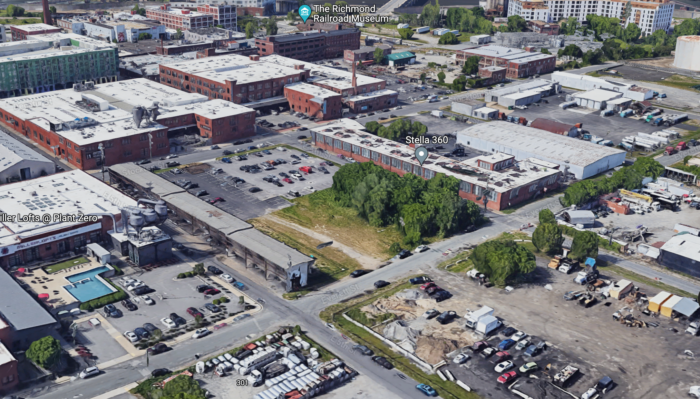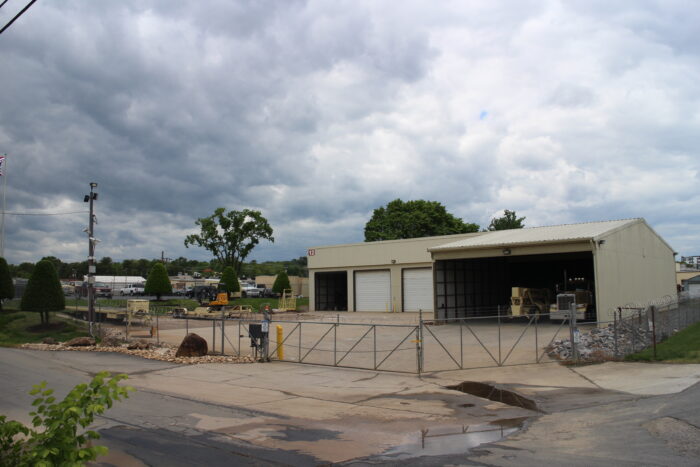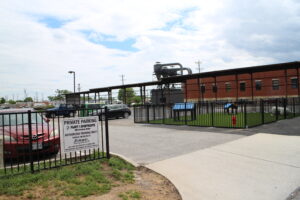
The Stockton Street site spans an entire city block and is primarily parking and a grassy area. (Google Maps)
The southeastern part of Manchester continues to gather steam, as two more sites in that part of the neighborhood are being teed up for redevelopment.
A pair of rezoning requests were filed in recent weeks for 400 Stockton St. and 507 Marx St., each seeking TOD-1 Transit-Oriented Development district designations.
The larger of the two sites is at 400 Stockton St., which is a 2-acre parking lot and grassy area that spans an entire city block. The land is split between two parcels, one of which is owned by Philadelphia-based PMC Property Group and the other by local developer Rick Gregory.
A few blocks to the south is the 1.1-acre Marx Street plot, which is owned by local concrete contractor W. J. Rapp Co. The property houses a 6,000-square-foot garage but is mostly a parking lot and unimproved land.
It’s unclear whether any immediate development plans are fueling the rezoning requests.
Hirschler’s Jeffrey Geiger and Susan Smith are representing the party behind the Stockton Street rezoning request, and said their client declined to comment. The Marx Street applicant is represented by Mark Baker and Will Gillette of Baker Development Resources, and wasn’t available for comment.
Neither the Stockton Street or Marx Street rezonings are listed on an upcoming Planning Commission agenda.
It does seem, however, that each site is being eyed for residential redevelopment.
In the applicant’s report for the 400 Stockton St. rezoning, Geiger and Smith write that the property is “ripe for development that will continue the rejuvenation within this gateway area of the city,” and that the rezoning would enable new construction similar to adjacent projects like the Plant 1 and Stella 360 apartments.
The Marx Street rezoning applicant’s report, penned by Baker, states that a rezoning would permit redevelopment of the property with residential uses and/or “neighborhood-serving uses to support existing housing.” Last year, another piece of W. J. Rapp-owned land at 600 Maury St. was rezoned, but no further plans have been filed.
Both sites fall in a part of Manchester around the Maury Street-Interstate 95 exit that’s seen a flurry of investor and developer interest in the last six months.
Local developers Tom Papa and Duke Dodson are planning a 163-unit apartment building at 500 Maury St., and earlier this year a pair of lots down the street from them sold, with Charlottesville apartment developer Castle Development Partners spending $3.1 million on 301 Maury St. and PRMS Investments out of Raleigh buying 401 Maury St. for about $5 million. Last fall, Nashville’s Tessera Development filed a rezoning request for the 2-acre TruckPro site at the corner of Marx Street and Commerce Road.
Since being introduced in 2017, TOD-1 has been a popular zoning designation sought by developers, as it allows for up to 12 stories in height and a mix of uses.

The Stockton Street site spans an entire city block and is primarily parking and a grassy area. (Google Maps)
The southeastern part of Manchester continues to gather steam, as two more sites in that part of the neighborhood are being teed up for redevelopment.
A pair of rezoning requests were filed in recent weeks for 400 Stockton St. and 507 Marx St., each seeking TOD-1 Transit-Oriented Development district designations.
The larger of the two sites is at 400 Stockton St., which is a 2-acre parking lot and grassy area that spans an entire city block. The land is split between two parcels, one of which is owned by Philadelphia-based PMC Property Group and the other by local developer Rick Gregory.
A few blocks to the south is the 1.1-acre Marx Street plot, which is owned by local concrete contractor W. J. Rapp Co. The property houses a 6,000-square-foot garage but is mostly a parking lot and unimproved land.
It’s unclear whether any immediate development plans are fueling the rezoning requests.
Hirschler’s Jeffrey Geiger and Susan Smith are representing the party behind the Stockton Street rezoning request, and said their client declined to comment. The Marx Street applicant is represented by Mark Baker and Will Gillette of Baker Development Resources, and wasn’t available for comment.
Neither the Stockton Street or Marx Street rezonings are listed on an upcoming Planning Commission agenda.
It does seem, however, that each site is being eyed for residential redevelopment.
In the applicant’s report for the 400 Stockton St. rezoning, Geiger and Smith write that the property is “ripe for development that will continue the rejuvenation within this gateway area of the city,” and that the rezoning would enable new construction similar to adjacent projects like the Plant 1 and Stella 360 apartments.
The Marx Street rezoning applicant’s report, penned by Baker, states that a rezoning would permit redevelopment of the property with residential uses and/or “neighborhood-serving uses to support existing housing.” Last year, another piece of W. J. Rapp-owned land at 600 Maury St. was rezoned, but no further plans have been filed.
Both sites fall in a part of Manchester around the Maury Street-Interstate 95 exit that’s seen a flurry of investor and developer interest in the last six months.
Local developers Tom Papa and Duke Dodson are planning a 163-unit apartment building at 500 Maury St., and earlier this year a pair of lots down the street from them sold, with Charlottesville apartment developer Castle Development Partners spending $3.1 million on 301 Maury St. and PRMS Investments out of Raleigh buying 401 Maury St. for about $5 million. Last fall, Nashville’s Tessera Development filed a rezoning request for the 2-acre TruckPro site at the corner of Marx Street and Commerce Road.
Since being introduced in 2017, TOD-1 has been a popular zoning designation sought by developers, as it allows for up to 12 stories in height and a mix of uses.





The two hottest redevelopment communities continue to announce new construction on the horizon. Rick Gregory told me in 2001 to work Manchester though that was against the grain in real estate circles. He was right! Thanks for the tip Rick.
To toot my own horn, not that it mattered, I told multiple people in Richmond that it was my belief that Manchester was going to have the most torrid growth for two negative reasons: a lack of complain-y residents and a lack of “History” that would be defended by a certain types of people.
I found it VERY interesting that the one big anti-growth complaint, by Legend, ended up having the public eventually turn on them when they started seeming unreasonable — in many districts, unreasonableness is looked upon as a kind of Virtue.